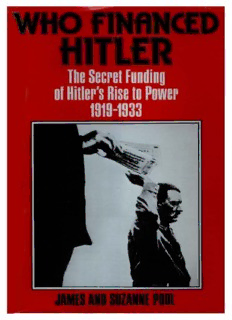
Who Financed Hitler PDF
Preview Who Financed Hitler
JamesPool& Suzanne Pool TheSecretFundingofHitler's RisetoPower1919-1933 A RAVEN BOOK MACDONALD ANDJANE'S . LONDON COfrYright©1978byJamesE.PoolIIIandSuzannePool A Raven Book Thisisajointprojectof Macdonaldand[one's PublishersLimited andFuturaPublicationsLimited First published in GreatBritain in 1979by Macdonaldandjane'sPublishersLimited Paulton House 8Shepherdess Walk London NI 7LW ISBN 035404395 1 Reproducedfromcamera-readycopy supplud PrintedandboundinGreat Britain by RichardClay (The Chaucer Press) Limited Bungay, Suffolk To our parents Manyofthose whohave contributedvaluableinfonna tion wish toremain anonymousforreasons which are easily understood. Although we can not mention everyone individually. we would like to express our sincere gratitude to all of those who have assisted in making this bookpossible. Contents Preface 1 1 A Mysterious Beginning 4 2 Billions 40 3 Ford and Hitler 85 4 Kirdorfand Thyssen 131 5 What Did Big Business Want? 175 6 Depression 229 7 Hitler's Foreign Financiers 290 8 Big Business Attempts to Stop Hitler 336 9 Bribes and Blackmail 415 Appendix 493 Footnotes 496 Selected Bibliography 521 Articles 527 Index 529 Ifmoney gobefore, allways do lie open. -Shakespeare Preface AdolfHitler did not come topowereasily. He began his political career in 1919and did not become Chancellor until fourteen yearslaterin1933.During this timeit tooka tremendous sumof money to support the Nazi Party. Where it came from, who providedit, and why, are the topicsofthis book. There have been many bookswritten on the Nazi period, but this most important aspect of Hitler's activity-one of the very keys to his success-has never been dealt with. One reason is that much of the information about financial contributions has onlyrecently come tolight, but the primary reason is an under standable reluctance toacknowledgethe ease with which money can subvert the democratic process. Historyisreplete with unsavory talesofpoliticalfinancing, and there is a serious question whether democratic principles can everultimately be upheld in an atmosphereofunsupervised and unpublicized political fund raising. Perhaps the newly created Gennan democracy was more vulnerable than most free societies,yet the story ofhowHitler found the necessary money toundermine the WeimarRepublic has universal implications. InGennanyfrom1919to1933,politicalpartieswerelittlemore than toolsforpowerfulinterestgroups. Hitlerwasquick torecog nizethisand turnhisformidableand nefarioustalentstothe task of fund raising. His methods were unscrupulous. At first he courted the powerful;thenashispartygrewinsizeand strength, he wasperfectly willingtouse blackmail and bribery togain his ends. Butit must beadmitted that he knew the valueofmoney: 2 WHO FINANCEDHITLER that it could purchase almost all the necessary resources of politics, such as propaganda campaigns, newspaper coverage, full-timestaff,etc. In short,Hitlerknew thatmoney meantpower. Itiseven partlytruethatHitlerwas able tosellan evilidealike anti-Semitism simply because he had the support of wealthy contributors. By continuous propaganda even the greatest un truth will be believed by some people. There were many anti SemitesinGennanylongbeforeHitler,butthey belonged tosmall splinter parties that were ineffective because of their endless squabbling. Large donations provided Hitler with the needed tools to organize these fringe elements and turn them into a major political force. Discoveringtheexactsumsofcontributionsandtheidentityof contributors is not an easy task. Moneymovessilently as wellas easily.Cash leaves no tracks. Checkscan belaundered- passed through intennediaries and false corporations-to obscure the original sourceoffunds. But,despitethedifficulties, thesearchis worthwhile. Moneyis the tracerelementin thestudyofpolitical power. Light thrown upon transactions involving financing il luminates the flow of both influence and power. Hitler was launched on his political career by a wealthy and powerful secret society,none of whose members were big busi nessmen. Otherfunds camefrom themost unexpected sources. Gennany's mostimportantJewish industrialist even gave to the Nazis-tomake themdependenton his money in hopesofeven tually disrupting them. Hitler got some of his biggest "con tributions" by first discovering the corrupt dealings between certain big industrialists and prominent liberal politicians, and then blackmailing the industrialists with threats ofexposure. Hitler's fund raising gave birth to many of the techniques of covert funding and dirty tricks that later became the stoek-in tradeofmostmajorgovernments. Thedouble subsidiarycorpora tions through whichCaptainErnstRohrnchanneledannyfunds to Hitler were so secret in their operations that, even after the government became aware of the missing money, the corpora tions were able to continue functioning undetected for about a year. One ofthe mostimportant and unexpected discoveries ofthis studyis theimportanceofforeign financing in bringing Hitler to power. Hitler received money from Austria, Britain, Czecho- PREFACE 3 slovakia, Finland, France, Italy, Holland, Hungary, Switzerland, Sweden, and the United States. Itis true that some money came fromGermanslivingin thesecountries, butmost ofitcamefrom prominent foreign citizens. Their motives varied: Henry Ford wanted tospread his antj-Semitic philosophy,Mussolinihoped to encourage German fascism, Grand Duchess Victoria of Russia wanted tosupport anti-Communism, Sir HenriDeterdingaimed toget back his oilinterests confiscated by the Communists, etc. Those who financed Hitler, both Germans and the foreigners, arejustasresponsibleforhis coming topowerastheactiveNazis whospread anti-Semitic propagandaorfought in thestreets. Yet, because of theirinfluence and the powerofmoney,few of them were prosecuted at Nuremberg. Many are nowexposed here for the first time. .
Description: